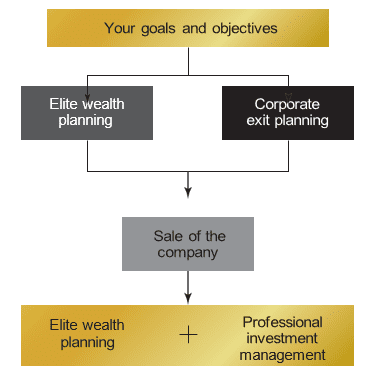More Than a Sale: Why You Need a Comprehensive Exit Strategy
Updated on October 9th, 2019 | By Anthony Glomski  | Leave a Comment
| Leave a Comment

Selling a company you’ve worked hard to build is about a lot more than getting a big sale price. You’ve also got to be sure you don’t leave money on the table—and that you’re prepared to protect and manage that wealth so it supports what you most want from life. Comprehensive exit planning can help you achieve all those goals.
Key Takeaways:
- What’s in your wallet? Selling a business isn’t just about the sale price—it’s about how much you walk away with.
- You need an exit plan. Asset protection strategies can be vital when business owners sell their firms.
- It’s okay to rethink your strategy. After the sale of a business, an exit plan should be revisited and revised as needed.

Many entrepreneurs looking to sell their companies—and the professionals who help them—focus most, if not all, of their attention on getting the best price. Understandably, everyone wants to maximize the sale value. But what if they’re making a mistake?

Many entrepreneurs looking to sell their companies—and the professionals who help them—focus most, if not all, of their attention on getting the best price. Understandably, everyone wants to maximize the sale value. But what if they’re making a mistake?
While getting the best price for a business is great, usually there’s more to the transaction. Entrepreneurs and their families should know what they’ll pocket coming out of the sale—and what to do with all that wealth. Additionally, there are other concerns that transcend money, such as ensuring that those in senior management keep their jobs.
These and other issues fall under the broad umbrella of comprehensive exit planning—a type of advanced-level planning that a growing number of successful entrepreneurs are engaging in when it comes time to sell their businesses.
Let’s take a closer look at this important step in the process of selling a company.
The Need for a Comprehensive Approach
Selling a business is usually one of the most significant transactions in an entrepreneur’s career. The owner has created value in his or her company and is now about to harvest a great deal of that value!
Comprehensive exit planning involves corporate exit planning—the sale of the business itself—but also includes strategies and solutions to maximize and protect family wealth for a broader range of desired results (see Exhibit 3).

If you’re a business owner, comprehensive exit planning starts with your goals and objectives. Your expectations—from what you want for your business to how you envision the next stage of your life—are instrumental in determining how you approach comprehensive exit planning. This is where going through a discovery process with a financial professional can be extremely helpful.
Once your agenda is set (though you will likely refine it over time), you can move on to elite wealth planning and corporate exit planning.
Access the Top 10 Wealth Planning Strategies for Successful Entrepreneurs

Access the Top 10 Wealth Planning Strategies for Successful Entrepreneurs
Elite Wealth Planning
Elite wealth planning is typically focused on the personal side of wealth. It is a comprehensive planning process that brings together state-of-the-art technical expertise, legal strategies, financial products and the human element in a synergistic manner.
The human element is the personal and emotional component that includes everything and everyone that is important to you—as well as everything and everyone that could be affected by the wealth planning.
For many entrepreneurs, elite wealth planning seeks to achieve two goals:
1. Structure the ownership of a company to minimize taxes. Based on your particular situation, the professionals in your corner will help you to identify possible strategies to lower—and in some cases, eliminate—the taxes you would otherwise have to pay on the sale of your company.
2. Protect assets (including your company) from unfounded and frivolous lawsuits. Many entrepreneurs do a substandard job of ensuring their personal wealth is protected from people who would try to take it unjustly. Depending on the circumstances, it’s possible to legally insulate your wealth.
Corporate Exit Planning
Many business owners sell for less than they’re worth. While they may be great at running their companies, they tend to know little to nothing about selling businesses for maximum value. As a result, they make mistakes and shortchange themselves.
“Corporate exit planning is a strategic guide for selling your business. It addresses the sale process—taking into consideration your overall goals and any concerns you might have.”
CLICK TO TWEET
It makes sense to start this planning well in advance of a sale. Depending on the nature of your company, it might take months (or even years!) to make sure all the pieces are in place to generate maximum sale value.
Example: Many privately-held businesses are dependent on the founders for continued success. In that case, it’s important to support the transition ahead of time by finding highly capable professionals who can fill those roles and will stay with the company when it’s been sold.
To create a strong corporate exit plan, we recommend the following:
- Know the value of your company. There are a number of ways to determine a company’s worth. Valuation is part science and part art.
- Identify the drivers of business value. These are the aspects of your company that are attractive to potential buyers. They become important in marketing the company and negotiating with the prospective buyer.
- Leverage value enhancement possibilities. You should take actions that enhance the company’s valuation, from fixing management problems to locking in customers to eliminating any personal expenses that are being run through the company.
- Analyzing the exit options. There may be many types of potential buyers. Examples include family, senior management, competitors and private equity firms. The possibilities and implications of each exit option should be evaluated.
- Decide when to sell. Macroeconomic factors and business cycle factors play roles in deciding the optimal time to sell, as do personal matters. Being ready when circumstances align is valuable.
- Use effective marketing strategies. Marketing can play a major role in selling a company. The ability to reach a larger number of interested buyers, for example, can create a competitive environment that can prove very beneficial to you.
Revisiting Your Plan
After the sale of your business, your personal world will change—usually quite significantly. It’s then that elite wealth planning comes roaring back into the picture. For example, you may very well need to upgrade your estate plan. You might also benefit from restructuring your asset protection plan.
Of course, there’s also that large pool of liquid assets that the sale likely created—assets that need to be managed. If you lack the expertise, it’s critical to find high-caliber, trustworthy professionals who can help you invest your wealth in alignment with your goals and objectives.
Other issues come in to play post-sale, as well. For example, families often embrace philanthropy in a bigger way after selling their companies. They suddenly find they have the time and money to donate to the causes that are deeply meaningful to them. This can open up the need for charitable planning and the formation of private foundations, donor-advised funds and other philanthropic vehicles.
Take Action
Ultimately, a comprehensive exit plan will accomplish four things:
- Help you focus on what is important to you—your goals and objectives.
- Ensure you get the best price for your company based on the parameters you set.
- Make sure you walk away from the sale of your business with the most after-tax money possible, taking into account your overarching agenda.
- Position you to best manage the proceeds and protect your wealth after the sale.
If you’re a business owner and have such a plan in place, congratulations! You’re set up for success.
If not, we’re happy to help. Contact AG Asset Advisory at info@agassetadvisory.com to discuss any issues or concerns you might have around selling your company or preparing to sell it down the road. Some advanced planning now might be valuable to you when the time comes to exit.
0 Comments
Submit a Comment
Meet Anthony
Anthony Glomski is the founder of AG Asset Advisory, an internationally recognized SEC-registered Family Office. His team works extensively with entrepreneurs so they don’t miss out on any potential opportunities and they get the results they want. This collaborative process addresses an array of family, financial, and lifestyle concerns along with coordination and oversight of various professionals to keep everyone focused tightly on their goals.
0 Comments
Submit a Comment

Work With Us
Contact:
Our Mission:
We design bespoke wealth planning strategies and customized solutions for highly successful entrepreneurs that avoid missing potential opportunities and achieve the outcomes you want.





Meet Anthony
Anthony Glomski is the founder of AG Asset Advisory, an SEC-registered Family Office. His team works extensively with successful entrepreneurs so they don’t miss out on any potential opportunities and get the results they want. This collaborative process addresses an array of family, financial, and lifestyle concerns along with coordination and oversight of various professionals to keep everyone focused tightly on their goals.